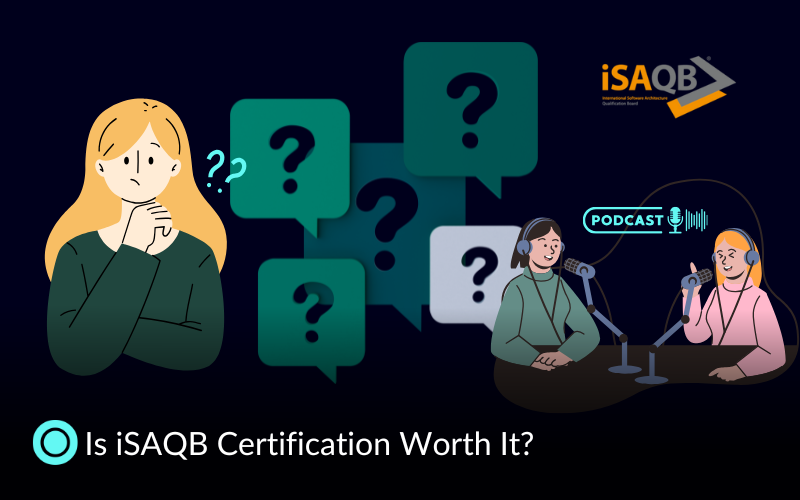If you’re considering getting certified as a software architect, you’ve likely seen the debates:
“It’s just a piece of paper.”
“You can learn it all on the job.”
“It’s expensive and not even recognized everywhere.”
From Reddit threads to tech forums, skepticism around iSAQB certification is loud and often emotional. Some call it a “money trap.” Others say it gave them the clarity, vocabulary, and credibility they were missing for years.
But what do real professionals say?
We didn’t want to add just another opinion piece to the noise. Instead, we asked real architects from companies like Bosch, Daimler Truck, Finnova, and Inverso GmbH to answer the most searched questions about iSAQB, based on where they are in their careers, what they learned, and whether they’d do it again.
Why People Are Asking This Question in the First Place
Before we get into success stories and real outcomes, it’s worth asking:
Why is iSAQB under fire in the first place?
If you browse platforms like Reddit or Stack Overflow, it won’t take long to find comments calling the certification a “money trap”, “too theoretical,” or “not worth it unless your employer pays.” These doubts aren’t new and they reflect a broader skepticism in the tech industry toward certifications in general.
This sentiment has been echoed in multiple online threads, where professionals share both genuine criticism and strong support. Many point out that the iSAQB Foundation level can feel like a repeat of academic content, and the Advanced level assignment is time-consuming and tough to complete while working full-time.
Featured Resource:
What is iSAQB CPSA-A Certificate & How to get it?
Software Architecture: The Ultimate Guide
But there’s another side and it doesn’t come from anonymous comments.
It comes from professionals who’ve completed the program and used it in real-life projects, promotions, and team collaborations. That’s where our podcast comes in.
Let’s hear what they actually said.
What Real Architects Say About iSAQB Certification
We asked professionals from a range of industries, automotive, finance, AI, enterprise IT, and with different levels of experience, to share their unfiltered thoughts on the iSAQB program. Their answers reflect not just a single verdict, but a spectrum of value, depending on career stage, expectations, and goals.
“Yes, It Was Worth It for Me Because…”
Several of our guests credited the certification with unlocking clarity, career shifts, or simply helping them speak the right architectural language.

It was a very valuable year for me and I'm glad that I did it. I would do it again. If there was a next level, I would totally go for it. Next time I'm asked to do an architecture, I know which are the most important points… I got really valuable feedback from the people who revised my work.

It allowed me to switch from a dev role with architecture responsibilities to a full-time architecture role. - Without a doubt, it helped me communicate better with stakeholders and developers.

In just two to three days, you gain a solid foundation… which you can deepen through real-world experience. - It wasn’t the certificate alone, but it supported my promotion and personal development.
Across these stories, a few themes stood out:
-
It helped formalize and validate skills they already sensed but hadn’t structured.
-
It offered a common vocabulary for working with teams, management, and stakeholders.
-
It created space for reflection, improvement, and growth.
“It Depends on What You’re Looking For…”
Other professionals took a more nuanced stance, not dismissing the certification, but also not treating it as a magic key.

The exam assignment was very valuable… But the courses were overpriced. If it were possible, I’d say do the exam but skip the training. Unfortunately, that’s not how it works.

For someone with embedded system experience like me, I felt there wasn’t enough hands-on. The theoretical knowledge was useful, but it could go deeper.

The brand is only known to the experts… but it helps you approach technical debt, analyze architecture layers, and justify your decisions better.
These responses point to an important insight:
The iSAQB certification gives back what you expect from it.
If you're early in your career or transitioning to architecture, the structure can be a huge help. If you're already experienced, it may serve more as a benchmark or networking opportunity — but not necessarily as deep new learning.
What Skills Do You Actually Gain Through the Certification?
One of the most common claims in online debates is:
“You can learn all this on the job.”
But our guests offered a different view. While many acknowledged that real-world experience is irreplaceable, they also pointed to very specific skills and mindsets that iSAQB helped them sharpen, often faster and more clearly than project work alone.
Skills You Can’t Learn Just On the Job

It’s less about specific skills and more about a mindset… a toolbox of methods (like arc42) and referenceable knowledge that makes solving architectural challenges more manageable.

Before this, none of my projects had well-documented architecture… Now I know how to structure a real architecture document, with justifications and decision history. That’s not something you usually get to do unless someone already trusts you.

As an architect, if no one else takes charge of the system, it’s my job. The certification helped me internalize that from stakeholder communication to requirements to system ops.
Better Communication with Stakeholders and Developers

Without a doubt. It helped me explain decisions clearly, and argue with confidence, especially when speaking to management.

I became more aware of how important communication is and how easily misunderstandings arise. The course gave me strategies to argue more effectively.

The information alone doesn't make you a better communicator. But if you're able to form this information into valid and convincing arguments for sure it helps with stakeholders and developers.
Impact on Real-World Projects

Some of the design patterns and architectural thinking I explored in the training aren’t common in embedded systems. It gave me new ideas to scale and simplify architecture.

The certification project was like being thrown into cold water. I had to develop my own method for documenting everything from scratch and when I got feedback, I saw things I’d completely missed. That learning effect stays with you.

After the certification, I felt more confident. Not just with theory, but in knowing what really matters in software architecture.
Is It Necessary for Every Software Architect?
Not everyone needs a certification to be a good architect, but for some, it makes a real difference. Whether it’s necessary or not often depends on where you are in your career.
Is It Only Useful If You're New to Architecture?

Every developer who takes their job seriously should do the Foundation level.

It’s a great way for developers to show they’re ready to step into an architecture role.
Would You Recommend It to Experienced Architects?

I wouldn’t recommend it to someone very experienced the courses felt overpriced for the value.

For seniors stuck in the same kinds of projects, it can help broaden your architectural thinking.
If you're just starting out or changing direction, it’s a strong investment. If you’ve already led architecture for years, it depends on your learning goals.
Summary: When Is It Worth It, and When Might It Not Be?
Whether it's worth it for you specifically is a function of your goals, your timing, and your experience.
It can be worth it if:
-
You wish to transition from development to architecture.
-
You don't have a systematic way for communicating and documenting architecture.
-
You desire feedback from experienced trainers on real case scenarios.
-
You seek credibility when you are applying for architecture positions.
It might not be worth it if:
-
You already possess a wealth of deep architecture experience.
-
You are expecting an immediate salary hike owing to certification alone.
-
You like working alone and don't require outside guidance.
Ask yourself:
Thinking about a career change?
Do you prefer a systematic method in order to develop your work?
Would peer-reviewed feedback help you grow faster?
If yes, then iSAQB might be a smart next step.
If you want to know the whole history behind these quotes, here you can find the full interviews, in the form of podcast episodes and written responses, with professionals interviewed for this post:
Stephan Schlatter
Senior Software Engineer & Software Architect
Helbling Technik AG
Read the Interview Transcript
Tobias Ammann
Business Lead Stream Technology Services & Senior Software Architect
Bedag Informatique SA
Read the Interview Transcript



